
Boy Meets Books
Picture a snotty-nosed kid with a homemade sandwich in one cargo short pocket, and Pokemon cards in the other. He’s got a backpack on, and he’s carrying his skateboard. That kid was me, as you will probably guess when you take a look at my picture book debut, Papá’s Magical Water-Jug Clock (Astra, 2023).
As teachers know, looking back on your own real-life experiences is sometimes the best possible way to start writing, and I hope you can use my book to inspire your students to write down the funny, touching, amazing stories from their own lives. And writing down our stories can be just the beginning. For me, it turned out to be a thrilling way to re-connect—to my family, to my culture, and not least, to the place I look back on as a second home: my local library.
Back Home to the Library
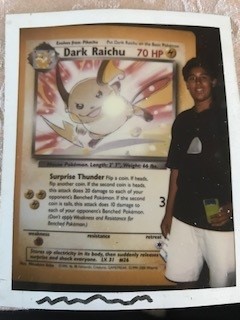
Jesús Trejo
Here’s something else you should know about that kid in Papá’s Magical Water-Jug Clock: He spent his free time gobbling up book after book. I basically grew up in the library throughout the early ’90s and into the 2000s, the era when books with card pockets and “due date slips” systems were upgraded to barcodes. I was at the library so often mainly because my parents were both clocking in long hours and, despite juggling multiple jobs, they weren’t always able to afford childcare. So, they (like many parents) did the next best thing—they would drop off their only child at the Long Beach Public Library Main Branch.
Being so close to our apartment, the library was the perfect place to grow up! The librarians would help me with my homework, and they had reading programs in the summer. If I had extra time, I jet down to use the VCR/DVD players and watch stand-up comedy specials, all in the same building. Librarians were my babysitters (If you’re a librarian reading this, you’re probably rolling your eyes and saying, “Oh…we know!”), but most important, they were my first influencers. They knew what I liked, and their recommendations always made me feel seen.
A few other things stood out for me at the Main Library Branch. The first was the little off-white bookshelf. It stood out from all the other mid-century orange oak wood-colored bookshelves. That off-white bookshelf was filled with books in Spanish. My parents both having immigrated from Mexico, were exclusively Spanish speakers, but in fact, neither of them could read or write even in Spanish. So, it made that one little shelf super important and welcoming to me. It was like a sanctuary or an island that welcomed me into reading and the world of books in a way my parents could not have done. And once that happens to a kid, that entry into books, a whole new world springs into existence, full of possibilities.
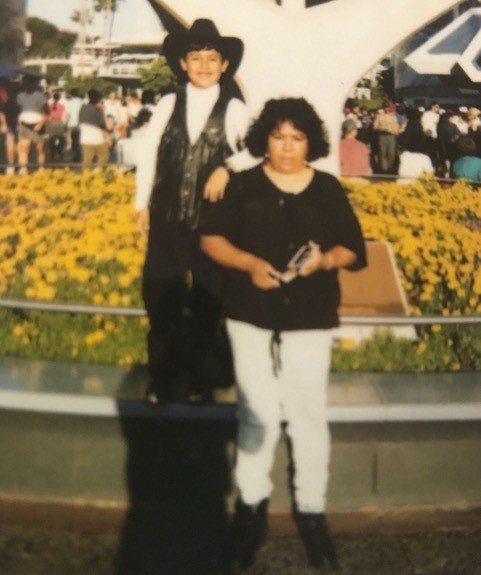
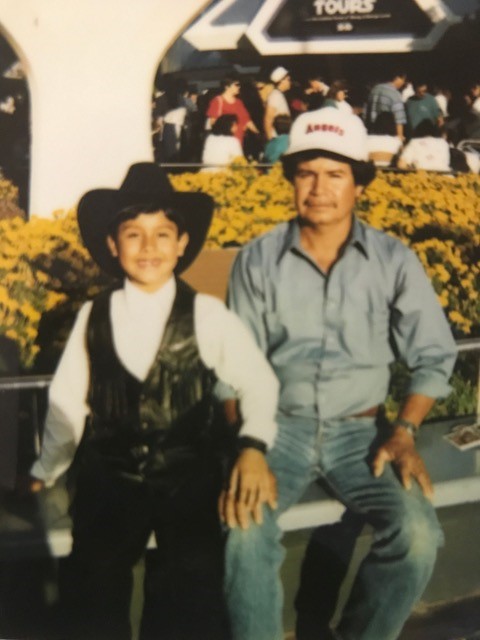
The second thing is that thanks to the librarians who steered me to the right books, I met characters I loved, characters I identified with, and who became my lifelong friends. And it’s not that there were little Mexican American kids who looked and talked like me in those books at that time. There were not (even to this day, they’re not always easy to find) so I identified in other ways. Clifford the Big Red Dog! He meant so much to me because I was always the biggest kid in the class. I felt like I always loomed over the other kids in the class pictures. Clifford made being a little oversized seem like a fun and funny adventure. And I was also a high-energy kid who maybe got into a little mischief now and then, not because I wanted to make trouble, not at all. Actually, I always wanted to be good and helpful to my parents because I was hyperaware of how hard they worked. But it seemed like the crazy and funny situations just came my way, kind of like they did for Clifford.
And third, I was fascinated with all things library, meaning everything from those mid-century library oak wood card catalogs to the Dewey Decimal System itself. I became obsessed. The smell of old paper and glue that would swirl around that old library was something I was convinced that if I could bottle and sell it, I would be very rich. Because who doesn’t like the smell of old reference books? (Or as I like to call them “Books you can’t check out!”)
The Joke’s On Me
Once I had a better command of the English language, I started to venture off into the rest of the library, finding a home first in the 700s section. In due time, I would venture off into the 800s section—and that’s where I had my Spider-Man moment. I got bit not by a radioactive spider but by a joke book—I had gotten the comedy bug.
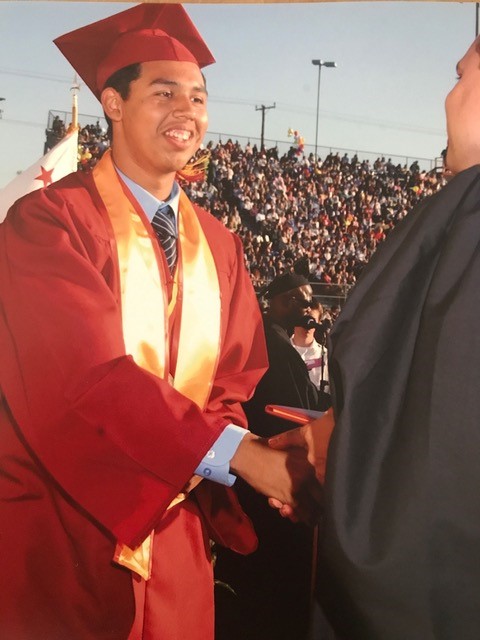
I was 20 years old when I decided to become a stand-up comedian, I realized early on that it was not just about telling jokes on stage, which is always super fun (but in reality, only 1% of the gig). Stand-up comedy is about good writing.
I remember having an early conversation with my dear editor, Maria Russo, about how comedians have to work their butts off, constantly rewriting and performing until a set is airtight, with every minute accounted for. She pointed out that that is just what is happening in picture books. So much needs to be conveyed in so few pages! As I worked on the story that became Papá’s Magical Water-Jug Clock, I came to see that the ingredients of a good picture book and a 5-minute late-night show set are essentially the same. Both need to be airtight and packed with story and punchlines.
But of course, there’s something else about a picture book that is unique and so important in telling a story for kids: the illustrations. Working with Eliza Kinkz has been so wonderful. She has brought not only the perfect cultural specificity in how she’s created the look of these characters and their world, but on page after page, she was also able to add the visual punchlines (in stand-up comedy we call it “Act -Outs”) that this story needs, to really kick the humor into the highest possible gear.
Meeting Kids Where They Are–In English and Spanish
When I looked back at my childhood and realized that there were no books that had kids who looked like me, no books where the parents had the jobs my parents had, who talked the way we talked, I knew I wanted to write a kids book that would also be released in English and Spanish. I’m thrilled to release my book in Spanish, too, as El Barrilito Mágico De Papá (Astra, 2023). My partner, Adria Marquez, who was born in El Paso, Texas, and raised in Juarez, Mexico, and grew up with the best of both worlds right on the border, was responsible for the translation of the book. She acted as a cultural consultant, as well. We had a ton of in-depth conversations about my experience growing up as the son of immigrants in California and how that shaped our language. We wanted the Spanish version of the book to be authentic to our culture and to celebrate the experiences that immigrants have when coming to this country.
For me, one of the best parts of this process has been realizing just what a silly and funny character I was as a kid! And as I spent time thinking about that kid again, I wanted to pay tribute to my parents and the way they raised me. I was so lucky that I was given my inheritance early on, in the form of the hard work that they modeled for me, along with all the love, humor, and strong values that I proudly champion today. I think a lot of Latino, Chicano, Pocho, and immigrant kids will identify with my story and maybe recognize pieces of their own life in Papá’s Magical Water-Jug Clock.
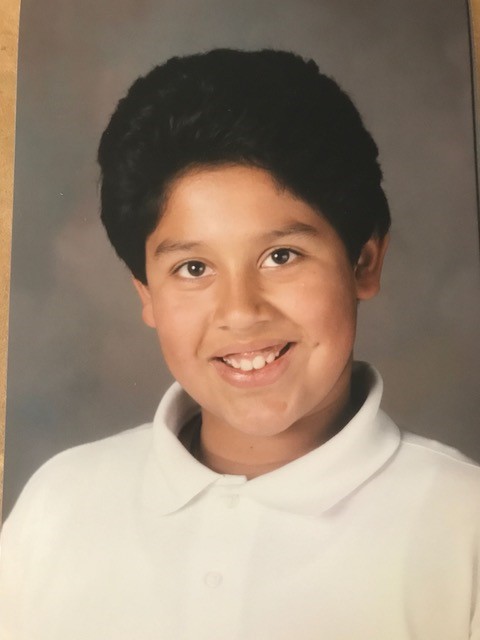
Jesús
My biggest hope is that my stories are funny first and appealing enough to make this new generation of kids fall in love with books the way I did. But this time, even more kids will be able to see themselves and their families in a book, and that’s all the better.
Text and images are courtesy of Jesús Trejo and may not be used without express written consent.

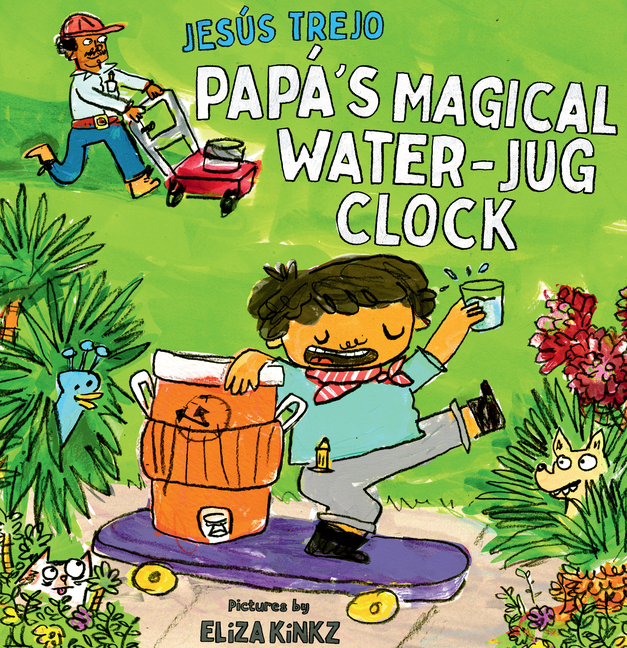
Leave a Reply